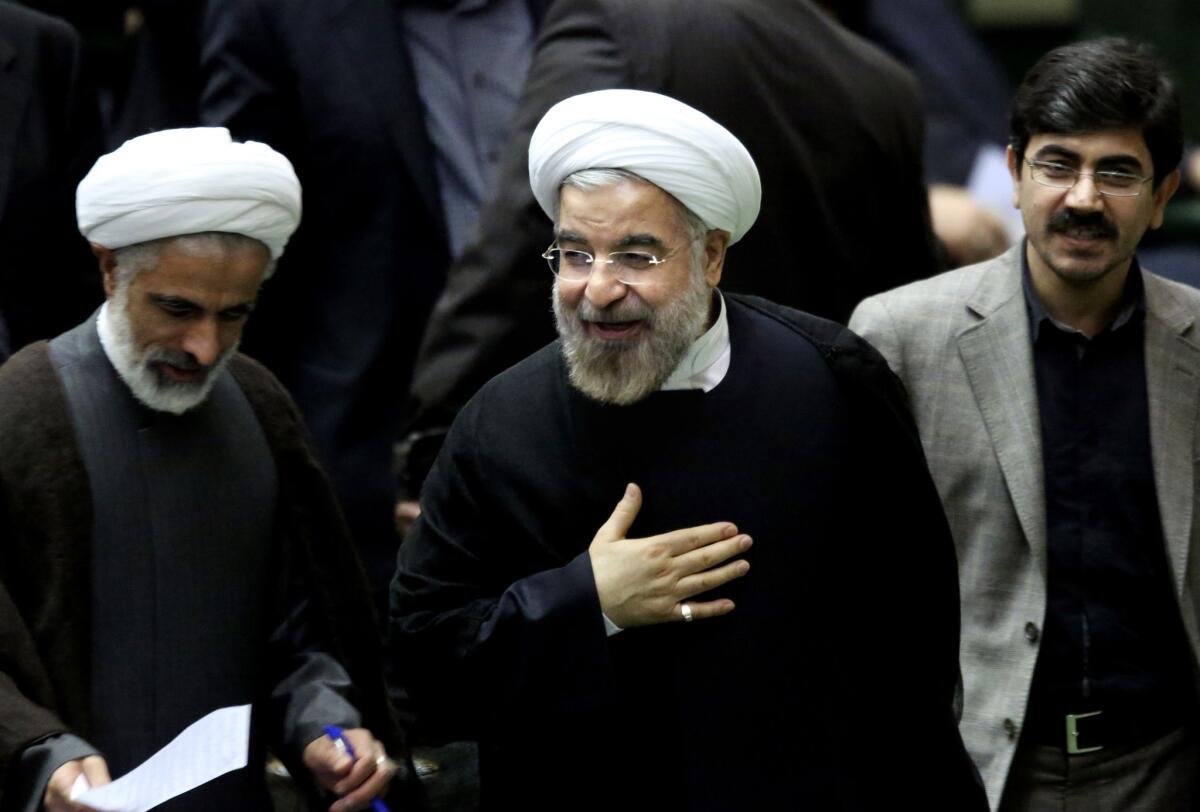Iranians frustrated by lack of deal on their nuclear program

- Share via
TEHRAN — Iranians expressed frustration Sunday with the lack of a much-anticipated breakthrough in nuclear talks with world powers, with many analysts blaming France and Israel but holding back on traditional outbursts against the United States.
Still, moderates expressed hope that an accord could be reached at future negotiating sessions, though hard-liners suspect of the entire process were predictably more pessimistic.
Kayhan, a hard-line newspaper associated with Iran’s supreme leader, Ayatollah Ali Khamenei, called the results of the latest round of talks “ambiguous” and declared that world powers were “blackmailing” Iran.
Moderates supportive of the government of President Hassan Rouhani tended to follow the line of Foreign Secretary Mohammad Javad Zarif, who was present in Geneva for the talks and appeared optimistic after marathon negotiations ended early Sunday.
“We are all on the same wavelength, and that is important. That gives us impetus to move forward the next time,” Zarif told reporters in Geneva after the talks concluded. “It’s something we can build on and move forward.”
The semi-official Fars news agency pointed to “destructive roles of France and Israel” for the failure of negotiators to reach an interim deal after three days of talks between Iran and six world powers: the United States, Russia, China, France, Britain and Germany. Fars accused French Foreign Minister Laurent Fabius, who told French radio that Paris could not accept a “sucker’s deal,” of packing a metaphorical “revolver” to the sessions.
Israel, Iran’s archenemy, is not party to the nuclear negotiations, but various Iranian observers said its influence was succeeding in stalling progress in Geneva. Israeli Prime Minister Benjamin Netanyahu blasted the potential accord as “the deal of the century” for Iran even before any of its terms were made public.
Reports from Geneva indicated that France had raised objections to several terms of a possible preliminary agreement, including the status of Iran’s uranium enrichment program and a heavy-water reactor under construction in Arak, 200 miles southwest of Tehran. Hard-liners assailed the inclusion of the Arak facility in the talks.
“This is a new pretext raised by France on behalf of Israel,” said Hamid Reza Taraghi, an influential conservative analyst.
Rouhani, whose administration marked its 100th day in office on Sunday, insisted that Iran would not retreat from any “red lines,” including Tehran’s avowed right to enrich uranium, a contentious issue because enrichment can lead to weapons-grade material.
“We have said to the negotiating sides that we will not answer to any threat, sanction, humiliation or discrimination,” Rouhani said during a speech to the National Assembly, according to Iran’s student news service. “For us there are red lines that cannot be crossed.”
ALSO:
Venezuela frees Miami journalist
Cosmonauts take Olympic torch for a walk in space
Typhoon Haiyan: Thousands feared dead in Philippines
Twitter: @mcdneville
Special correspondent Mostaghim reported from Tehran and Times Staff Writer McDonnell from Beirut.
More to Read
Sign up for Essential California
The most important California stories and recommendations in your inbox every morning.
You may occasionally receive promotional content from the Los Angeles Times.













